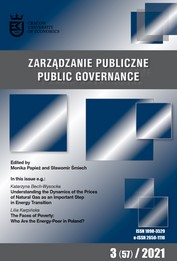The Integration of the Polish Electricity Market in 2015–2021
The Integration of the Polish Electricity Market in 2015–2021
Author(s): Magdalena SikorskaSubject(s): Energy and Environmental Studies, Environmental and Energy policy, Present Times (2010 - today), EU-Accession / EU-DEvelopment, Financial Markets
Published by: Uniwersytet Ekonomiczny w Krakowie we współpracy z Wydawnictwem Naukowym Scholar
Keywords: electricity market integration; European energy policy; internal energy market;
Summary/Abstract: Objective: Creating a common energy market is a tremendous challenge for the European Union, directly impacting all areas of life. Energy integration is essential, because it creates the conditions to build solutions that support energy security, as well as it facilitates the integration of renewable sources, increases electricity affordability, and improves competition and environmental sustainability. The process of integrating energy markets in the EU’s countries and Poland began in the 1990s. This paper aims at describing the integration process of the Polish energy market within the European Union. This study tried to verify the following research hypothesis: The degree of the integration of the Polish energy sector with the European energy market is increasing with the introduction of new energy market regulations in the EU. Research Design & Methods: This article uses a qualitative method to describe the changes taking place in the EU and in the Polish energy policy with regard to creating a common energy market. Furthermore, the cross-border synchronous and asynchronous flows in Poland are described. In the following part of the paper, quantitative methods are applied to analyse electricity’s domestic production and consumption. Additionally, the balance of actual flows with individual countries is analysed. The leading exporters and importers of electricity are also presented, as well as it is shown how the role of the Polish electricity market changed from exporter to importer. Findings: The study confirmed the hypothesis that the degree of integration of the Polish energy sector with the European energy market increases with the introduction of new energy market regulations in the EU. This is particularly visible from the perspective of possibilities to increase electricity import to Poland after introducing the Third Energy Package in 2007 (including Directive 2009/72/EC). Currently, the main directions of electricity imports to Poland are mainly Germany and Sweden. On the other hand, Poland exports the most electricity to Lithuania, Slovakia, and the Czech Republic. Moreover, since 2016, Poland has become a net importer of electricity (in previous years, it had been a net exporter). Implications / Recommendations: The results presented in the article may be relevant for policymakers, as they indicate whether the European Union’s energy policy affects the degree of integration of the energy sector, especially the Polish market. The results might also interest consumers and the industry, as energy market integration brings many economic, social, and environmental benefits (e.g. lower electricity prices, electricity system reliability). Further research could use more advanced statistical methods to look in more detail at the integration of the Polish energy sector with the European energy market. Contribution / Value Added: The author tries to present how the changes in the European energy policy influence the integration of the Polish energy sector with the European energy market. The article attempts at supplementing the existing research in this area, as the recent changes in the energy policy had not been covered in the literature, which referred only to selected countries.
Journal: Zarządzanie Publiczne
- Issue Year: 2021
- Issue No: 57
- Page Range: 40-54
- Page Count: 15
- Language: English

